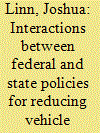| Srl | Item |
| 1 |
ID:
103491


|
|
|
|
|
| Publication |
2011.
|
| Summary/Abstract |
This paper compares the incentives a carbon dioxide emissions price creates for investment in low carbon dioxide-emitting technologies in the electricity sector. We consider the extent to which operational differences across generation technologies - particularly, nuclear, wind and solar photovoltaic - create differences in the incentives for new investment, which is measured by the operating profits of a potential entrant. First, astylized model of an electricity system demonstrates that the composition of the existing generation system may cause electricity prices to increase by different amounts over time when a carbon dioxide price is imposed. Differences in operation across technologies therefore translate to differences in the operating profits of a potential entrant. Then, a detailed simulation model is used to consider a hypothetical carbon dioxide price of $10-$50 per metric ton for the Electric Reliability Council of Texas (ERCOT) market. The simulations show that, for the range of prices considered, the increase in electricity prices is positively correlated with output from a typical wind unit, but the correlation is much weaker for nuclear and photovoltaic. Consequently, a carbon dioxide price creates much stronger investment incentives for wind than for nuclear or photovoltaic technologies in the Texas market.
|
|
|
|
|
|
|
|
|
|
|
|
|
|
|
|
| 2 |
ID:
163558


|
|
|
|
|
| Summary/Abstract |
Currently, the US federal government sets fuel economy and greenhouse gas standards for passenger vehicles and promotes innovation for electric vehicles, including plug-in and fuel cell vehicles. Many states are considering their own transportation policies that would promote the adoption of electric vehicles. In principle, federal and state policies may interact in important ways, either positively or negatively. We examine federal subsidies for electric vehicles, and find that additional state policies that target only emissions of new vehicles and particularly electric vehicles are unlikely to decrease national greenhouse gas emissions in the short run, primarily due to interactions with federal regulations. We examine the conditions under which state and federal vehicle policies can have positive long-run social benefits, and suggest areas for future research to inform policy choices.
|
|
|
|
|
|
|
|
|
|
|
|
|
|
|
|
| 3 |
ID:
161828


|
|
|
|
|
| Summary/Abstract |
Many cities in developing countries are experiencing rapid urbanization along with deteriorating traffic congestion and air quality, so it is important to understand what affects travel demand in developing countries. In this paper, we study how housing location affects travel behavior in Beijing, a city in a developing country. We use subsidized housing as a source of variation for housing location—individuals in subsidized housing live much closer to the city center than individuals in the control group. We exploit a change in the eligibility for subsidized housing generated by China's housing reforms to address the potential endogeneity of subsidized housing. We find that subsidized housing substantially reduces distances traveled for commuting and discretionary trips and that subsidized individuals are less likely to drive but have similar rates of automobile ownership. The results suggest that housing location can have long-lasting effects on travel behavior and automobile use in a developing country. We discuss policy implications of these findings.
|
|
|
|
|
|
|
|
|
|
|
|
|
|
|
|